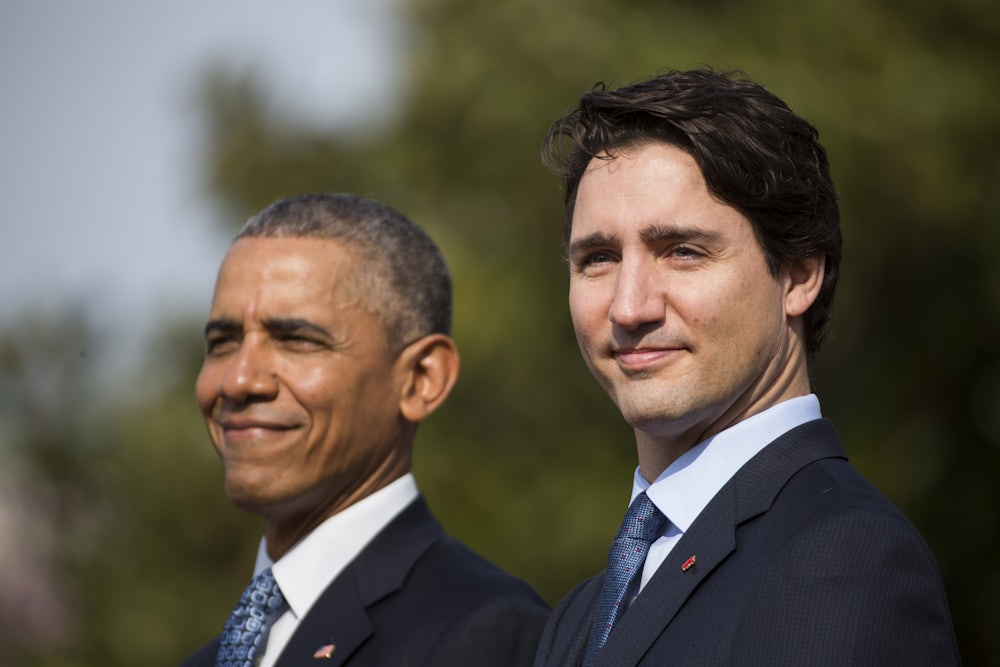The most acute political scandal in North America—the one with the greatest chance of toppling the head of government anytime soon—is occurring not in the United States, but Canada.* Prime Minister Justin Trudeau is barely hanging on to power after being accused last month of pressuring his attorney general to abandon the criminal prosecution of an influential company that hails from Quebec, his political stronghold.
Political media in the U.S. can’t comprehend how this can be so damaging. “There’s no money, no sex and nothing illegal happened,” wrote Rob Gillies of the Associated Press. “This is what passes for a scandal in Canada.”
It should also pass for a scandal in America, but selective prosecution—which spares the powerful while punishing those without connections—has become all too common in this country, and notably so under President Obama. As Democratic candidates seek to save America from President Trump’s kleptocracy, they ought to acknowledge that this era of unaccountability long predates him, and be as indignant about it as our Canadian neighbors.
SNC-Lavalin is a Montreal-based engineering firm that employs roughly 9,000 Canadians on numerous construction projects inside the country. It also does substantial business abroad, where it’s been accused for years of corruption and fraud. This specific case alleges that the company paid 48 million Canadian dollars (around 36 million USD) to Libyan government officials to secure construction contracts from 2001-2011, then defrauded the Libyans for about 130 million Canadian dollars.
The Royal Canadian Mounted Police submitted these charges in 2015, before Trudeau entered office. A successful criminal prosecution would bar SNC-Lavalin from bidding on any federal government contracts for 10 years. But the Globe and Mail broke the news in early February that Trudeau’s office had asked Attorney General Jody Wilson-Raybould to abandon the criminal charges. Wilson-Raybould, who also sat in Trudeau’s cabinet as justice minister, later confirmed a “barrage” of pressure from senior officials, including Trudeau himself, who asked her to “help out” with the case and “find a solution.” She rebuffed their campaign, was demoted, then resigned.
Trudeau’s team sought a deferred prosecution agreement (DPA), which would impose a financial penalty and some greater oversight of SNC-Lavalin, but no criminal sanctions, enabling it to continue to bid on government contracts. Prosecutors in Canada didn’t have the option of deferring criminal prosecution until a change in the law last year, one that SNC-Lavalin lobbied for.
While deferred prosecution agreements are new to Canada, they’ve been used in corporate settlements in the U.S. for more than two decades, particularly during and after the last financial crisis, when hundreds of DPAs were executed. In other words, the major difference between the scandal engulfing Canada’s government and what happens routinely here is that nobody in our Justice Department needs to be pressured to issue a deferred prosecution agreement.
The Justice Department’s most notorious DPA of the past decade was in 2012 with HSBC, the bank that facilitated money laundering for drug cartels and terrorist groups. Drug lords even designed specially shaped boxes filled with money that slid easily through HSBC Mexico’s teller windows. Neither HSBC nor its executives were criminally prosecuted, and the bank was merely fined $1.9 billion—around five weeks’ profit.
Justice Department officials had cautioned that criminal charges would destroy HSBC and put thousands of innocent bank tellers out of work. Eric Holder, Obama’s attorney general at the time, expressed concern that banks like HSBC have become so sprawling that “it does become difficult for us to prosecute.” The phrase “Too Big to Jail” was coined out of the HSBC mess. But Holder had been warning of “collateral consequences” for prosecuting corporations since a memo he wrote while deputy attorney general in 1999.
Trudeau echoed this reasoning in remarks last week about the SNC-Lavalin scandal. Referring to a meeting with Wilson-Raybould, he said, “I stressed the importance of protecting Canadian jobs and re-iterated that this issue was one of significant national importance.”
This justification for neglecting serious crimes is sometimes known as the Arthur Andersen defense, named after the accounting firm that destroyed documents as Enron’s auditor. The 28,000-employee company went out of business amid a successful prosecution, which the Supreme Court overturned years later on a technicality over jury instructions. (The firm had already split up by then.)
Law enforcers and business lobbyists alike have agreed that the Arthur Andersen case was a mistake that sent thousands of low-level accountants to the unemployment line. Few mentioned that Andersen employees simply got jobs with other accounting firms. Similarly, if SNC-Lavalin couldn’t bid on government contracts, somebody else would, and the same number of Canadians would fill those jobs.
Trudeau also made clear his real rationale for pressuring his attorney general: as a member of Parliament, he represents Quebec, home to SNC-Lavalin. Politicians are inclined to defend the interests of their constituents, but as prime minister, Trudeau’s actions affect the whole country. He sought to pervert the justice system so a favorite-son company could evade punishment and continue to profit from the Canadian government.
From his firing of FBI Director James Comey to reportedly trying to prevent the AT&T–Time Warner merger because he doesn’t like CNN (a Time Warner subsidiary), Trump has perverted the law in ways that tower over the relatively gentle nudges of Trudeau’s government. But the pre-Trump status quo, of perfunctory deferred prosecutions and no jail terms for financial fraudsters, was itself a scandal. That’s why jettisoning Trump won’t, on its own, restore the rule of law in America. The Democrats competing for president also must lay out a plan for treating every American equally under the law, no matter how rich or connected. Because the party’s last president failed this test.
